American Curl Longhair
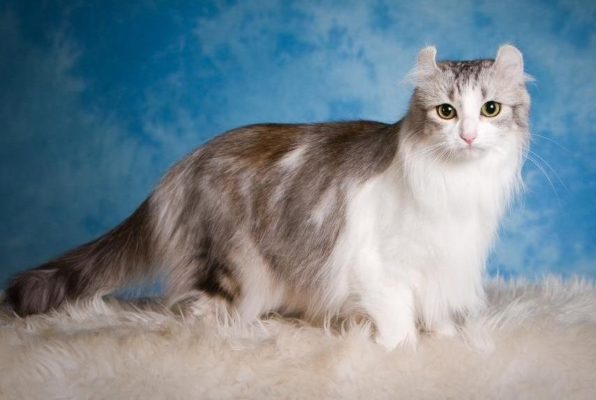
American Curl owners speak of its friendly nature. It adapts well to all living conditions and is undemanding. The American Curl Longhair does not mind spending time with children; he gets on well with them. However, active games with fidgety children are worth watching – the bent ears are prone to injury.
Table of Contents
Breed Information
| Origin | United States |
| Size | Males up to 40 cm Females up to 38 cm |
| Weight | Males 4.5-5 kg Females 2.5-4.5 kg |
| Fur Type | Semi-long-haired |
| Color | Any color variations are possible |
| Lifestyle | Indoors |
| Lifespan | 12-16 years |
| FIFe Classification | Category II: “Semi-long-haired”. Breed designation – ACL |
| WCF Classification | Group 2: “Semi-long-haired”. Breed designation – ACL |
| TICA Classification | AL |
| Group | Long-haired cats |
| Price | $1200-1600 |
Breed Photos
Origin History
The formation of the American longhair Curl breed began relatively recently. It gives every reason to consider the breed young. In 1981, in Lakewood, California, a married couple found a single cat that they took in. The cat’s appearance attracted their attention – its ears were unusually crooked, and its hair was also unusually curled. A little later, the cat gave birth to kittens with the same features. Breeding work on the offspring of the cat began with the goal of breeding a new breed. And by 1983, the newly created breed was shown at the California Cat Show.
The felinologists, who worked on the breed’s formation, gave it such a name precisely because of its curved ears. Research on the American Curl breed has shown that this peculiarity is a natural mutation of the gene responsible for the ears. There are reported sporadic cases where American Curl kittens are born with straight ears. They are called Curl Straight and are most often sold as regular house cats.
In 1985, the American Curl Longhair was officially recognized by the International Cat Fanciers’ Association TICA. The breed is considered rare, but it can still be found in the United States, Japan, and Australia.
Appearance
Representatives of the American Curl Longhair are not large and slender cats. Their weight should not exceed five kilograms. The length is one and a half times the height of the cat at the withers. The physique is slightly elongated but harmonious; the cat looks elegant. The head is of medium size, elongated, and without sharp outlines. The muzzle is wedge-shaped.
In profile, a slight rise is noticeable at the transition from the lower eyelid level to the forehead. The eyes are large, shaped like hazelnuts, set wide and slightly slanting. The color of the eyes is connected with the color of the coat, most often dark amber. The only blue color of eyes is possible in point cats.
The ears are wide, set high, and necessarily with curved tips. The angle of curvature of the ear should be at least 90 degrees. The angle is finally formed by about four months of the pet’s life. The curvature of the ears comes in three degrees. First, there are slightly bent ears, then a little more, and the most prestigious variant – bent crescent. The neck is rather muscular. The limbs are of moderate length. The paws are compact. The tail is fluffy and long, tapering toward the end.
According to the breed standard, the coat is considered semi-long. To the touch, the coat is not too thick but rather thin and silky. The undercoat is quite rare. The American Curl Longhair’s permissible colors are tortie, tabby, bicolor, colorpoint, a la Siamese cats, or monochrome.
Character
American Curl owners speak of its friendly nature. It adapts well to all living conditions and is undemanding. The American Curl Longhair does not mind spending time with children; he gets on well with them. However, active games with fidgety children are worth watching – the bent ears are prone to injury.
Representatives of the breed are unobtrusive but at the same time love attention and affection of the owner. They meow rarely, are quiet enough, and will not make a mess in your home. They treat strangers and guests at home respectfully but will behave reservedly in foreign territory.
Care
The American Curl Longhair does not require much care. Although the hair of the pet is long, it is very docile and not prone to tangling. It is enough to comb out about once every ten days. Keep an eye on the condition of your pet’s eyes and ears. It is recommended to wipe them and clean them from accumulated moisture or dirt twice a week.
It is very important to treat the ears gently so as not to hurt the pet. Do not pull them forward, and do not press too hard. The American Curl Longhair has claws that overgrow, and they must be trimmed every week. It is advisable to bathe the pet not more than once a month.
Education
The curiosity of the American Curl Longhair knows no bounds. He behaves discreetly but now and then strives to learn something new. To get an obedient and balanced cat, it is better to train it from an early age. American Curl is sensitive to its master’s mood and will gladly fulfill his requests. It is not prone to shenanigans and pranks and certainly will not do anything to spite the owner.
Common Diseases
American Curls do not suffer from severe genetic diseases. They have inherited good health and stamina from their ancestors. The only thing they may encounter is obesity.
Nutrition
You should eliminate all fatty foods from the diet of the American Curl Longhair. Make sure your pet’s diet is balanced. Premium medium breed food contains the vitamins needed to build a normal pet’s skeleton.
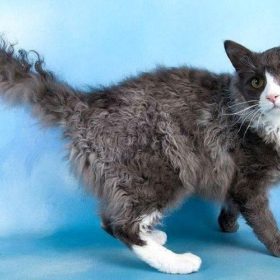 LaPerm Longhair
LaPerm Longhair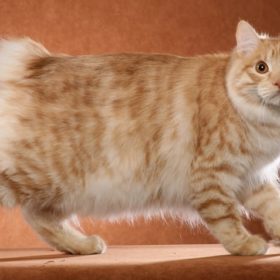 Kurilian Bobtail Longhair
Kurilian Bobtail Longhair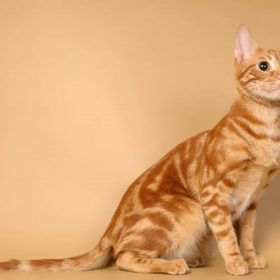 Anatolian Cat
Anatolian Cat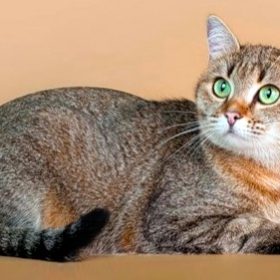 Celtic Shorthair (European Shorthair)
Celtic Shorthair (European Shorthair)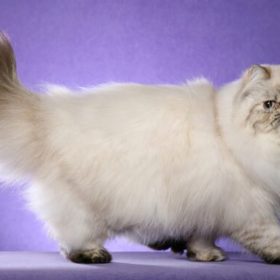 Persian (Colorpoint)
Persian (Colorpoint)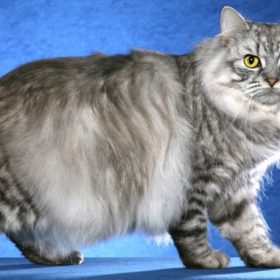 Cymric
Cymric